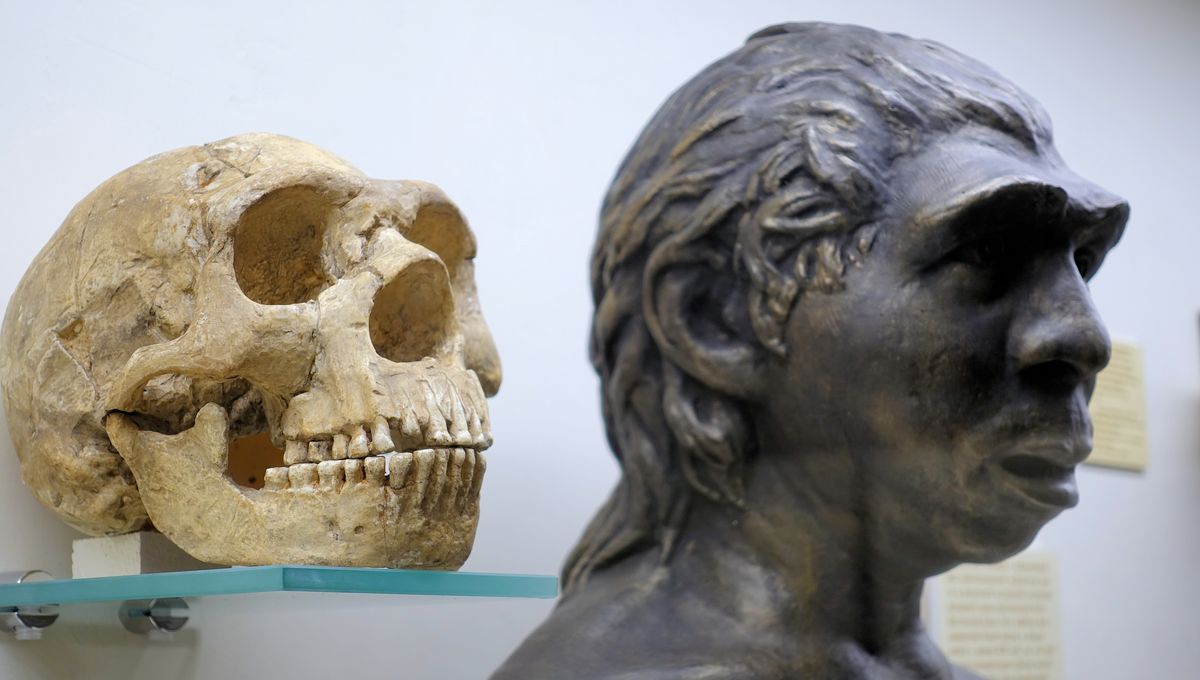
Homo sapiens may be the last humans standing, but we weren’t always alone. For much of our history, we coexisted with other members of our genus, and our prehistoric ancestors didn’t waste the opportunity to hook up with their Neanderthal and Denisovan relatives.
Many millennia have passed since these inter-hominid affairs, yet we all still bear the consequences of our predecessors’ promiscuity. Thanks to recent developments in ancient DNA detection and genome sequencing, scientists are now beginning to understand how this primordial genetic mingling continues to shape our health, appearance, and physiology.
Reviewing all the existing data on archaic human introgression into the modern human genome, the authors of a new study explain that because Homo sapiens migrated out of Africa in waves, different populations of humans ended up mating with Neanderthals in different regions of Eurasia. As a result, those of us alive today display a complex patchwork of introgressed sequences inherited from this now extinct lineage.
Recent work has also revealed that Homo sapiens interbred with three separate Denisovan populations. As a consequence, all non-African individuals now derive around 2 percent of their genome from Neanderthals, while certain Indigenous groups in Oceania have an extra 2-5 percent Denisovan DNA.
Looking at how these archaic genes actually affect us, the study authors explain that our Neanderthal DNA may have increased the size of our noses while our Denisovan heritage is associated with the width of our lips. This conclusion builds on previous studies which indicated that the Denisovans probably had narrower mouths than the average modern human.
There’s also some evidence to suggest that Neanderthal genes may have altered our circadian rhythm, making us more likely to wake up early in the morning. However, the majority of the surviving genetic sequences picked up from our extinct relatives are related to immune system functioning.
According to the researchers, this is not all that surprising, since both Neanderthals and Denisovans would have been better adapted to cope with the types of pathogens present in Eurasia than the incoming Homo sapiens arriving from Africa. Mating with the locals would therefore have enabled our ancient ancestors to pick up certain advantageous genes that would have provided protection from infectious microbes and therefore been passed down through natural selection.
“However, immune-related variants inherited from archaic hominins that were beneficial to modern humans in these new environments may also contribute to disease susceptibility in contemporary individuals,” write the study authors. For instance, while one cluster of Neanderthal genes on chromosome 12 appears to confer protection against severe COVID symptoms, another on chromosome three may actually increase our susceptibility to the illness.
Meanwhile, an analysis of modern Japanese genomes has revealed an association between Denisovan DNA and health conditions such as type II diabetes and coronary artery disease.
Such discoveries have helped to unravel the genetic history of our species, yet many gaps remain. For instance, it’s still unclear how gene flow between different human species impacts the DNA of modern African populations, with some scholars believing that the genetic signature of an unknown “ghost” hominid may be present in these groups.
Nonetheless, the study authors state that “recent work has continued to provide new insights into the history of gene flow between modern humans, Neanderthals, and Denisovans and has clearly demonstrated that admixture had important functional, phenotypic, and evolutionary consequences in modern humans.”
The study is published in the journal Current Opinion in Genetics & Development.
Source Link: We All Carry Neanderthal And Denisovan DNA – Here’s How That Affects Us